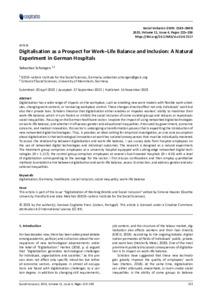|
Digitalisation as a prospect for work–life balance and inclusion: A natural experiment in German hospitals
Schongen, Sebastian
![[img]](https://madoc.bib.uni-mannheim.de/66075/1.hassmallThumbnailVersion/SI%2011%284%29%20-%20Digitalisation%20as%20a%20Prospect%20for%20Work-Life%20Balance%20and%20Inclusion%20A%20Natural%20Experiment%20in%20German%20Hospitals.pdf)  Vorschau |
|
PDF
SI 11(4) - Digitalisation as a Prospect for Work-Life Balance and Inclusion A Natural Experiment in German Hospitals.pdf
- Veröffentlichte Version
Download (241kB)
|
|
DOI:
|
https://doi.org/10.17645/si.v11i4.7117
|
|
URL:
|
https://www.cogitatiopress.com/socialinclusion/art...
|
|
URN:
|
urn:nbn:de:bsz:180-madoc-660754
|
|
Dokumenttyp:
|
Zeitschriftenartikel
|
|
Erscheinungsjahr:
|
2023
|
|
Titel einer Zeitschrift oder einer Reihe:
|
Social Inclusion
|
|
Band/Volume:
|
11
|
|
Heft/Issue:
|
4: Digitalization of working worlds and social inclusion
|
|
Seitenbereich:
|
225-238
|
|
Ort der Veröffentlichung:
|
Lisbon
|
|
Verlag:
|
Cogitatio Press
|
|
ISSN:
|
2183-2803
|
|
Sprache der Veröffentlichung:
|
Englisch
|
|
Einrichtung:
|
Außerfakultäre Einrichtungen > Leibniz-Institut für Sozialwissenschaften (GESIS)
Außerfakultäre Einrichtungen > GESS - CDSS (SOWI)
|
|
Bereits vorhandene Lizenz:
|
 Creative Commons Namensnennung 4.0 International (CC BY 4.0) Creative Commons Namensnennung 4.0 International (CC BY 4.0)
|
|
Fachgebiet:
|
300 Sozialwissenschaften, Soziologie, Anthropologie
|
|
Freie Schlagwörter (Deutsch):
|
digitalisation , Germany , healthcare , social inclusion , social inequality , work–life balance
|
|
Abstract:
|
Digitalisation has a wide range of impacts on the workplace, such as enabling new work models with flexible work schedules, changing work content, or increasing workplace control. These changes directly affect not only individuals’ work but also their private lives. Scholars theorise that digitalisation either enables or impedes workers’ ability to maximise their work–life balance, which in turn fosters or inhibits the social inclusion of some societal groups and reduces or reproduces social inequalities. Focusing on the German healthcare sector, I explore the impact of using networked digital technologies on work–life balance, and whether it influences gender and educational inequalities. Pressured by government, economic concerns, and medical innovation, this sector is undergoing a transformation process that is expediting the introduction of new networked digital technologies. Thus, it provides an ideal setting for empirical investigation, as one core assumption about digitalisation is that technological innovation at work has societal consequences that must be individually mastered. To assess the relationship between digitalisation and work–life balance, I use survey data from hospital employees on the use of networked digital technologies and individual outcomes. The research is designed as a natural experiment. The treatment group comprises employees at a university hospital equipped with cutting‐edge networked digital technologies (N = 1,117); the control group comprises employees at several church‐owned hospitals (N = 415) with a level of digitalisation corresponding to the average for the sector. I first discuss confounders and then employ quantitative methods to establish a link between digitalisation and work–life balance, assess its direction, and address gender and educational inequalities.
|
 | Dieser Eintrag ist Teil der Universitätsbibliographie. |
 | Das Dokument wird vom Publikationsserver der Universitätsbibliothek Mannheim bereitgestellt. |
 Suche Autoren in Suche Autoren in
Sie haben einen Fehler gefunden? Teilen Sie uns Ihren Korrekturwunsch bitte hier mit: E-Mail
Actions (login required)
 |
Eintrag anzeigen |
|
|
 ORCID: 0009-0001-3576-5455
ORCID: 0009-0001-3576-5455



 Creative Commons Namensnennung 4.0 International (CC BY 4.0)
Creative Commons Namensnennung 4.0 International (CC BY 4.0) Suche Autoren in
Suche Autoren in